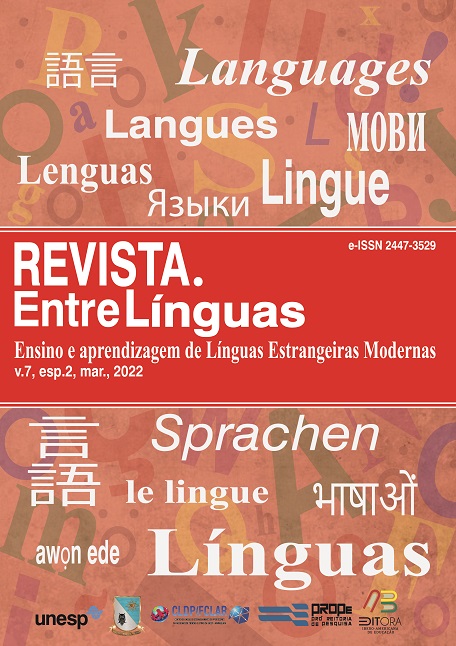Sobre o papel da percepção associativa no processo de tradução da literatura científica
DOI:
https://doi.org/10.29051/el.v8iesp.2.17483Palavras-chave:
Percepção associativa, Terminologia científica, Compreensão final, Empréstimos errôneosResumo
O objetivo deste artigo é discutir as possibilidades do método de percepção associativa da terminologia no processo de tradução da literatura científica e técnica. No processo de trabalho, os autores usaram métodos de pesquisa tradicionais juntamente com os experimentais. A tradução de textos científicos e técnicos exige certas habilidades e competências de especialistas desse tipo de atividade. O domínio perfeito da terminologia de um determinado idioma, o conhecimento de suas características e estrutura permite ao tradutor transmitir o conteúdo do texto original com a maior precisão possível, sem distorcer o significado. Os autores concluem que é necessário que o tradutor de textos científicos e técnicos esteja atento às mais recentes inovações e descobertas técnicas em um determinado campo da tecnologia.
Downloads
Referências
ABRAMOVA, N. E. Associative technologies of diagnostics of language signs. Yekaterinburg: Ural State Pedagogical University, 2018.
BOYARSKAYA, M. M. Problems of ambiguity in modern English. In: Collection of articles of the FIYA MAI. Moscow: Pero Publishing House, 2016.
DENISOVA, O. I. On the problem of neology in modern English. In: KALLIOPIN, A. K. (Ed.). Proceedings of the second scientific and practical conference "Actual problems of the theory of language and teaching of foreign languages". Moscow: "MAX Press", 2010.
LITVINOVA, M. Y. The term as the most important component of the vocabulary of the scientific and technical text of aviation topics. In: Collection of articles of the FIYA MAI. Moscow: Pero Publishing House, 2016. p. 156-167.
LURIA, A.R. Language and consciousness. St. Petersburg: Publishing House Peter, 2020.
NIKULINA, M.A. On the issue of interference in literal and functional-communicative translation. In: Professionally-oriented translation: Reality and perspectives. Moscow: RUDN Publishing House, 2012. p. 271-277.
OZHEGOV, S.I.; SHVEDOVA, N. Y. Explanatory dictionary of the Russian Language. Moscow: Publishing house Atberg 98, 2010.
SELIGEEVA, I. R. On the problem of formation of associative thinking of students in the system of additional education. Izvestiya VSPU, v. 3, n. 276, p. 15-17, 2017.
VEDENSKAYA, T. E. Modern methodological problems of linguistics. In: KALLIOPIN, A.K. (Ed.). Proceedings of the second scientific and practical conference "Actual problems of the theory of language and teaching of foreign languages". Moscow: "MAX Press", 2010.
VLASOVA, S. V. The role of translation correspondences in teaching scientific and technical translation to students of aerospace specialties. In: Collection of articles of the FIYA MAI. Moscow: Pero Publishing House, 2016. p. 138-146.
ZINCHENKO, V. P. Image and activity. Moscow: Publishing House of the Institute of Practical Psychology; Voronezh: NGO "MODEK", 1997.
Downloads
Publicado
Como Citar
Edição
Seção
Licença

Este trabalho está licenciado sob uma licença Creative Commons Attribution-NonCommercial-ShareAlike 4.0 International License.
Os manuscritos aceitos e publicados são de propriedade da Revista EntreLínguas. Os artigos publicados e as referências citadas na Revista EntreLínguas são de inteira responsabilidade de seus autores.
Transferência de direitos autorais – autorização para publicação
Caso o artigo submetido seja aprovado para publicação, já fica acordado que o(s) autor(es) autoriza(m) a UNESP a reproduzi-lo e publicá-lo na EntreLínguas, entendendo-se os termos “reprodução” e “publicação” conforme definição respectivamente dos incisos VI e I do artigo 5° da Lei 9610/98. O artigo poderá ser acessado pela rede mundial de computadores (Internet), sendo permitidas, a título gratuito, a consulta e a reprodução de exemplar do artigo para uso próprio de quem a consulta, desde que haja a citação ao texto consultado. Essa autorização de publicação 328 EntreLínguas, Araraquara, v. 1, n .2, p. 323-328, jul./dez. 2015 não tem limitação de tempo, ficando a UNESP responsável pela manutenção da identificação do(s) autor(es) do artigo. Os artigos publicados e as referências citadas na Revista EntreLínguas são de inteira responsabilidade de seus autores.











